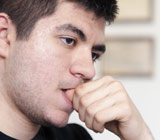Battling Bruxism and Saving Your Teeth
 Do you clench your jaw or grind your teeth? Bite your nails? Chew on pencils or toothpicks? Or, heaven forbid, unscrew hard-to-open bottle caps using your precious pearly whites?
Do you clench your jaw or grind your teeth? Bite your nails? Chew on pencils or toothpicks? Or, heaven forbid, unscrew hard-to-open bottle caps using your precious pearly whites?
Over time, habits such as these — referred to in dentistry as “parafunctional” (para – outside; functional – normal) or beyond the range of what nature intended — can inflict excessive wear and tear on your teeth. Besides the impact damaged teeth can have on your smile, so called “tooth to tooth” and “tooth to foreign object” behaviors can cause physical problems, such as jaw joint and muscle pain, headaches, earaches, and even neck and back pain.
Use of Excessive Force
Parafunctional behaviors exert an abnormal amount of force on your teeth — up to 10 times the amount used for biting and chewing. Tooth grinding or “bruxism” (from the Greek word brykein – “gnash the teeth”) is particularly detrimental and is commonly seen in individuals who are experiencing a stressful time in their life. Some medications can also trigger it. Since bruxism often occurs while people sleep, it’s possible to be unaware of it unless a partner comments (it can be noisy!) or a dental professional points out the tell-tale signs of wear.
To counter the adverse effects of nocturnal tooth grinding our office can create a customized night or occlusal (bite) guard. Typically fashioned from a hard, clear “processed acrylic” (wear-resistant plastic), this type of guard is amazingly inconspicuous. It is made to fit over the biting surfaces of the upper teeth only and is thinner than a dime. When it is worn, the lower teeth easily glide over the upper teeth rather than chomping into and gnashing with them, which minimizes the likelihood of erosion, chipping and uneven or excessive wear of the biting surface of the teeth. The guard is so unobtrusive, that some people even wear it as they go about their daily activities.
Remember: In addition to proper dental hygiene, you can help keep your teeth healthy by using them wisely!
If you would like more information about parafunctional habits like bruxism and ways to protect your teeth, please contact Dr. Cindy Sumarauw at 801-281-3500 to schedule an appointment for a consultation. You can also learn more about this topic by reading the Dear Doctor magazine articles “Stress & Tooth Habits” and “How And Why Teeth Wear.”


Leave a Reply